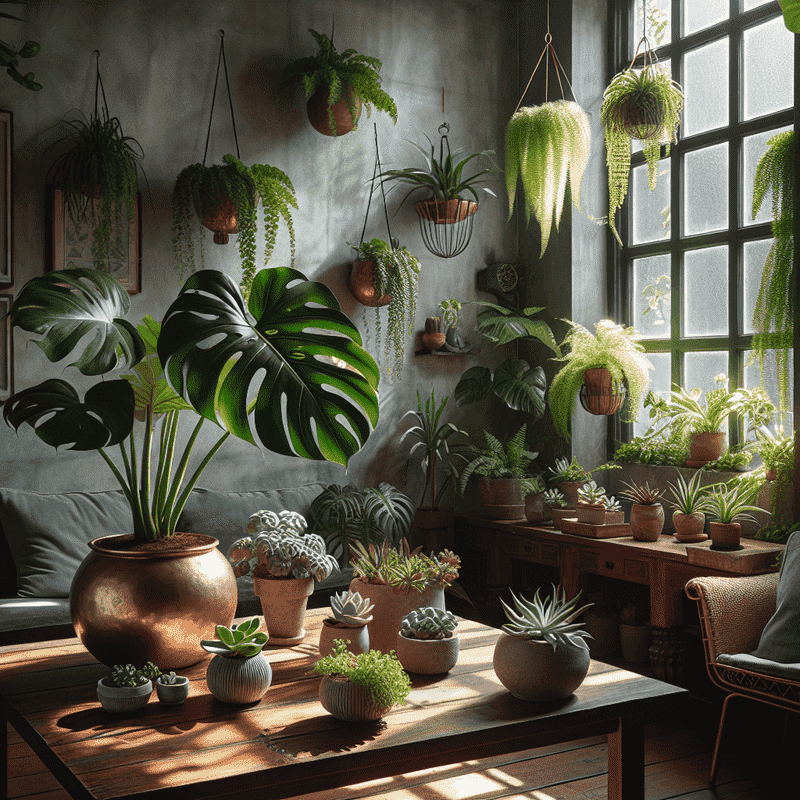Indoor Plants As Per Vastu Inside Home. We offer online and offline vastu consultations.
Vastu Shastra is a system that directs energy flow through the use of architectural principles. It also extends to the flora in your home. The right plants can enhance the beauty of your home and promote positivity. They also help to harmonize energy.
Indoor Plants As Per Vastu
The Vastu Shastra stresses the harmony and balance between earth, fire, water, air, and space. Positioning indoor plants according to these principles can have a significant impact on the mental and physical well-being of the residents.
The Plant Placement Guide:
- North-East Corner: Ideal corner for small, lush green plants. This direction is linked to water and prosperity. Here, plants like the peace lily and lucky bamboo could bring tranquility and prosperity.
- South-East Corner: Fire dominates this corner. Aloe vera and small cacti are good plants to place here. They can reduce stress by absorbing excess moisture.
- East: supports wooden elements. Fiddle leaf figs and other large leafy plants can bring positive energy to relationships and health.
Benefits of Indoor Plants as Per Vastu and Their Implications:
- Holy Basil (Tulsi): Tulsi is revered in many homes for purification. Placing Tulsi to the north, northeast, or east will invite divine energies and shield you from negative influences.
- Money Plant: This plant is known to attract wealth if placed in the east or north. It should not be placed in the northeast if it gets too tangled.
- Snake Plants: These plants are excellent for removing toxins. They can also be used to combat negativity.
- Vastu principles can be used to align plant types with their placement and ensure that beneficial energies flow.
- Vastu-friendly plants: Detailed care for Vastu-friendly plants
- Plants can also have a profound effect on the energy of your home. Each plant has a specific need in terms of sunlight and watering. Pruning is also important.
Optimal Care Techniques:
- Watering Rituals: Over-watering or under-watering your plants can result in negative energy buildup, while a lack of water can lead to stagnant, dry energy. Understanding the specific watering requirements of each plant is essential.
- Sunlight and Shade: Some species thrive in direct sunlight, while others do well in shade. Vastu-based placement can help you meet these requirements.
- Pruning: By regularly pruning dead leaves and excess growth, you can maintain the vitality of the plant and the energy in your home.
- You can enhance positive energy flow by gently touching your plants.
- Vastu-friendly plants have many benefits, including psychological and health benefits.
- Indoor plants have many psychological and health benefits. They also adhere to traditional Vastu principles.
Psychological Upheaval:
Stress Reduction Plants such as Lavender or Chamomile are known for their calming properties and can be placed in your bedroom or study to reduce stress levels.
Plants with vibrant flowers, such as Gerbera Daisy, can enhance moods and aesthetic value.
Physical Health Enhancements:
- Air Quality: Plants such as the Areca palm and spider plant have been known to purify air by removing pollutants and improving air quality.
- Humidity regulation: Plants like Boston Ferns, by transpiring, can maintain optimum humidity in the home. This is good for respiratory health.
The conclusion:
By incorporating Vastu principles into the placement of indoor plants, you can not only improve your home’s aesthetics and energy but also your mental and physical well-being. Try these ideas and you will notice a change in the dynamics of your home. You can also enjoy the purified air and peaceful atmosphere that these plants bring. Engage them, take care of them, and watch as they respond with positivity.
According to the Vastu Shastra, plants do more than just occupy space. They enrich it with vibrancy and life. This attracts prosperity and positivity.


